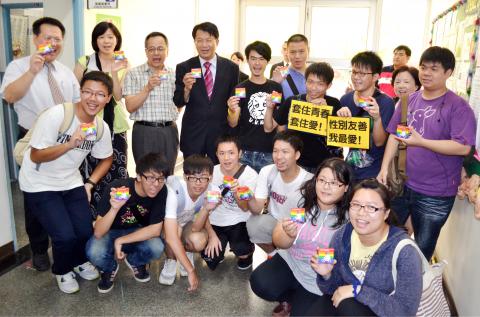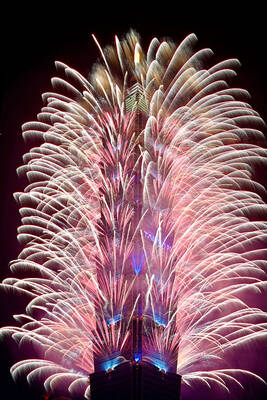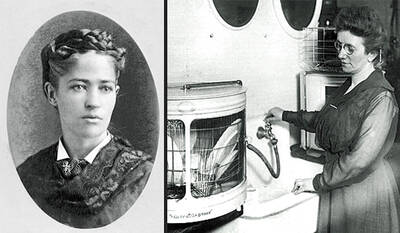Taipei City Government’s Department of Health has long been promoting the installation of condom machines on college campuses. There are now roughly 10 universities in Taipei that have set up condom machines. On June 18 the Chinese Culture University Student Association published a news entry on its Facebook page, saying that the school is now catching up and has installed a condom machine, which has provoked fervent responses from students.
In the past, after taking into account a variety of factors, Chinese Culture University declined the Department of Health’s suggestion that it set up condom machines. Now, all of a sudden, a condom machine has been placed right outside the 24-hour study center, to the surprise of many students. One student said that, “After two years of lip service, they finally did it.” Some jokingly said that, “There is no way we can use up all these condoms.” Another commented that, “I am kind of curious to know who will dare to buy them.”
Currently, several universities in Taipei have set up condom machines on campus. Soochow University, the University of Taipei and National Taipei University of Nursing and Health Sciences have each set up two machines, while Shih Hsin University, National Chengchi University, National Yang-Ming University and the National Taiwan University of Arts have each installed one condom machine.
(Liberty Times, translated by Ethan Zhan)

Photo: Tsai Wen-chu, Liberty Times
照片:自由時報記者蔡文居
台北市衛生局一直以來倡導校內設置保險套販賣機,而台北市已有十所左右的大學校,在校園內設置了保險套自動販賣機。六月十八日文化大學學生會在臉書粉絲團發布消息,指文大現也跟進設置了一台保險套自動販賣機,引發學生熱烈回應。
文化大學過去曾因為考量多方面問題,婉拒衛生局在校內設置保險套販賣機,現在突然在二十四小時開放的讀書中心外設置販賣機,讓學生們都相當意外。一名學生就表示:「講了兩年終於設置了。」還有人開玩笑說「用不完了」、「有點好奇誰敢去買」。
台北市目前已有多所大學在校內設置保險套販賣機,其中東吳大學、台北市立大學,以及國立台北護理健康大學,分別都設置了兩台;而世新、政大、陽明大學、台藝大等學校,也都設置了一台。
(自由時報)

A: Wow, US climber Alex Honnold has announced that he’s going to free-climb Taipei 101 on Jan. 24. And the challenge, titled “Skyscraper Live,” will be broadcast worldwide live on Netflix at 9am. B: Oh my goodness, Taipei 101 is the world’s tallest green building. Is he crazy? A: Honnold is actually the climber in the 2019 film “Free Solo” that won an Oscar for best documentary, and was directed by Taiwanese-American Jimmy Chin and his wife. He’s a legendary climber. B: Didn’t Alain Robert, “the French Spiderman,” also attempt to scale Taipei 101 in 2004? A: Yes, but

A: There are always adventurers who want to conquer Taipei 101 as a world-class landmark. Didn’t someone once parachute from the top of it? B: Yeah, that’s right. Austrian extreme sportsman Felix Baumgartner once parachuted from the rooftop observation deck in 2007 without permission. He died earlier last year in a powered paragliding crash at the age of 56. A: Hollywood superstar Tom Cruise also almost jumped off Taipei 101 for “Mission Impossible 3.” B: What? But I didn’t see the building in the movie. A: The news says that the film’s producers applied to the Taipei City

For many introverts, shy individuals and people with social anxiety, mingling at parties is often draining or arouses uncomfortable emotions. The internal debate about whether or not to attend large get-togethers can get especially intense during the holiday season, a time when many workplaces celebrate with cocktail hours, gift exchanges and other forms of organized fun. “Some people are just not party people,” City University of New York social work professor Laura MacLeod said. “With a workplace holiday party, there’s a pressure to be very happy and excited. It’s the end of the year, it’s the holidays, we’re all feeling grand.

Twelve dinner guests have just left your house, and now a tower of greasy plates stares back at you mockingly. Your hands are already wrinkling as you think about scrubbing each dish by hand. This nightmare bothered households for centuries until inventors in the 19th century tried to solve the problem. The first mechanical dishwashers, created in the 1850s, were wooden machines with hand cranks that splashed water over dishes. Unfortunately, these early devices were unreliable and often damaged delicate items. The real breakthrough came in the 1880s thanks to Josephine Cochrane, a wealthy American socialite. According to her own account,